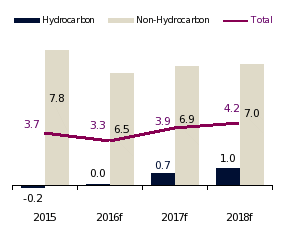The Qatari economy grew by 3.7% in 2015 compared to a year earlier. Consistent with the trends observed over the last four years, the non-hydrocarbon sector continued to be the engine of growth, while hydrocarbon production has remained broadly stable. As result, the non-hydrocarbon sector accounted for 63.8% of Qatar’s GDP in 2015, up from 48.9% in 2014. As outlined in our recently-published Qatar Economic Insight Report, we expect real GDP growth to accelerate from 3.3% in 2016 to 3.9% in 2017 and 4.2% in 2018 with the ramp up in investment spending and initial gas production from the Barzan project.
Year-on-year growth in Qatar’s non-hydrocarbon GDP reached 7.8% in 2015, driven by the large investment spending programme. The building and construction sector was the direct beneficiary of this programme, contributing an estimated 2.2 percentage points (pps) to non-hydrocarbon GDP growth. The rapid population growth from the influx of expatriate workers generated strong demand for services such as finance, insurance and real estate; trade, restaurants and hotels; and government services. Indeed, services were the largest contributor to non-hydrocarbon GDP growth, adding an estimated 5.0pps. Manufacturing was also one of the main growth sectors with a contribution of 0.7pps, reflecting Qatar’s movement up the hydrocarbon value chain towards refined petroleum products and petrochemicals.
At the same time, Qatar’s hydrocarbon production fell slightly by 0.2% in 2015 compared to a year earlier. The decline mainly reflectedlower crude oil production as natural gas output remained flat due to the moratorium on new gas projects at the North Field.
Real GDP Growth (%, year on year)

Sources: Ministry of Development Planning and Statistics, Haver Analytics and QNB Economics forecasts
The overall robust growth performance was achieved against a background of low oil prices, which declined sharply from an average of USD99.5/barrel (/b) in 2014 to USD53.6/b in 2015. The dramatic decline was mainly due to large additional supply from the US as well as OPEC. Even though demand growth hit a five-year high in 2015, this was still exceeded by the new supply. As a result, the oil market was over-supplied by around 1.8m barrels per day in 2015. And the price of oil was more than 50% lower than its level prior to mid-2014.
The oil price shock has not resulted in sharp declines in public spending, which would have hurt growth, particularly in the non-hydrocarbon sector. Instead, the government is absorbing this shock on its fiscal balance. As a result of lower hydrocarbon revenue and continued capital spending, the fiscal balance should turn into a deficit of 5.4% of GDP in 2016 from a surplus of 3.7% in 2015. However,the significant savings made during the last oil boom and low public debt ratios have allowed the government to access international capital markets to finance the projected deficit with ease through debt issuance. Qatar secured a USD5.5bn syndicated loan in January 2016 and then sold USD9.0bn of bonds in May—the largest ever bond issuance from a Middle East government.
Going forward, we forecast real GDP to grow by 3.3% in 2016, 3.9% in 2017 and 4.2% in 2018. The ramp up in investment spending, which is expected to peak towards the end of the decade, should continue to drive growth in the non-hydrocarbon sector. Furthermore, additional gas and condensates production from Barzan (a USD10.3bn gas production project to meet the rising domestic demand) is expected to lift hydrocarbon growth, notwithstanding the projected decline in crude oil production.
Disclaimer and Copyright Notice: QNB Group accepts no liability whatsoever for any direct or indirect losses arising from use of this report. Where an opinion is expressed, unless otherwise provided, it is that of the analyst or author only. Any investment decision should depend on the individual circumstances of the investor and be based on specifically engaged investment advice. The report is distributed on a complimentary basis. It may not be reproduced in whole or in part without permission from QNB Group.
